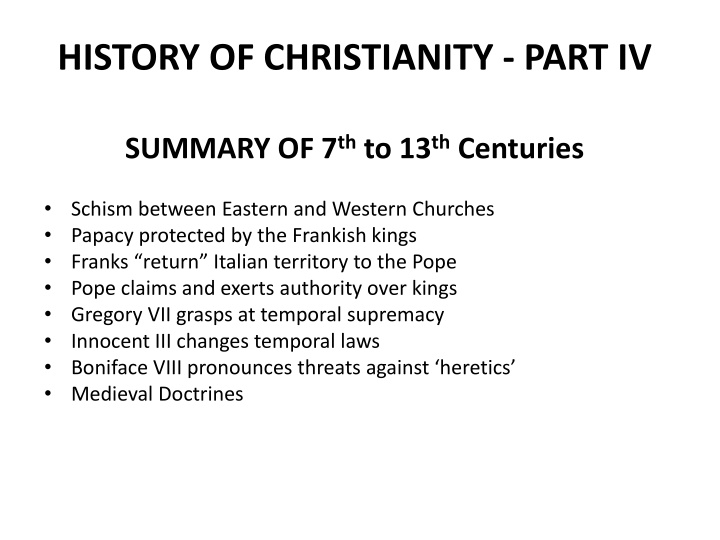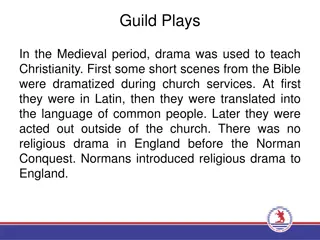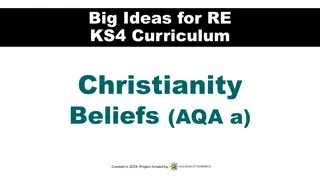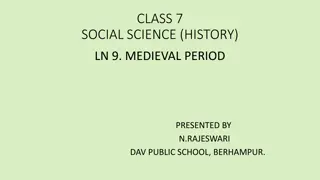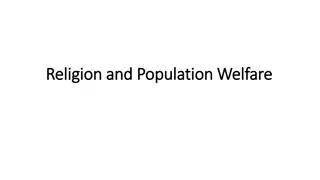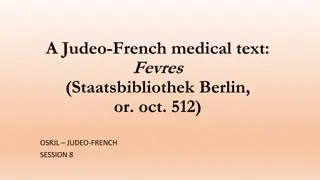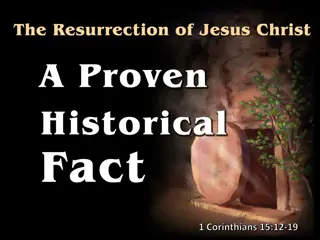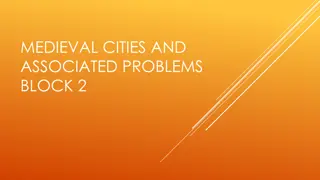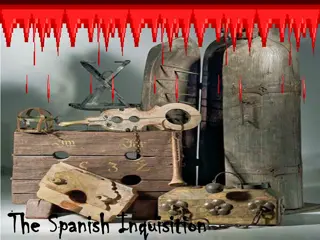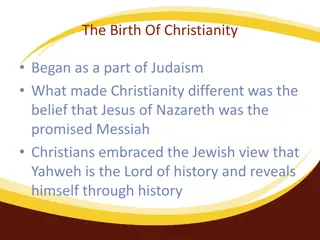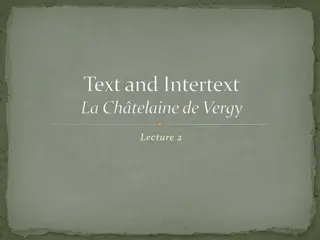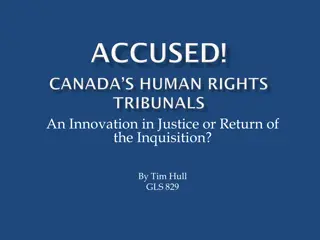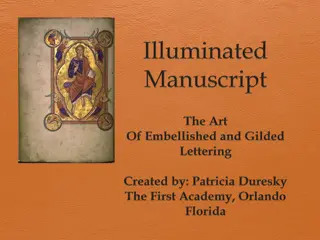Christianity in Medieval Times: Schism, Papacy, and Inquisition
The history of Christianity from the 7th to 13th centuries marked by the schism between Eastern and Western Churches, papal authority over kings, the rise of the Inquisition, and the punishment of heretics and dissenters. The power struggles between the Papacy and secular rulers, along with the enforcement of doctrinal conformity, shaped the religious landscape of the era.
Download Presentation

Please find below an Image/Link to download the presentation.
The content on the website is provided AS IS for your information and personal use only. It may not be sold, licensed, or shared on other websites without obtaining consent from the author.If you encounter any issues during the download, it is possible that the publisher has removed the file from their server.
You are allowed to download the files provided on this website for personal or commercial use, subject to the condition that they are used lawfully. All files are the property of their respective owners.
The content on the website is provided AS IS for your information and personal use only. It may not be sold, licensed, or shared on other websites without obtaining consent from the author.
E N D
Presentation Transcript
HISTORY OF CHRISTIANITY - PART IV SUMMARY OF 7thto 13thCenturies Schism between Eastern and Western Churches Papacy protected by the Frankish kings Franks return Italian territory to the Pope Pope claims and exerts authority over kings Gregory VII grasps at temporal supremacy Innocent III changes temporal laws Boniface VIII pronounces threats against heretics Medieval Doctrines
Part IV The punishment of heretics & dissenters The Inquisition The 14th to 16th Centuries Early Protesters Reformers Later Protesters
The Little Horn (Daniel 7) 8 I considered the horns, and, behold, there came up among them another little horn, before whom there were three of the first horns plucked up by the roots: and, behold, in this horn were eyes like the eyes of man, and a mouth speaking great things. 20 And of the ten horns that were in his head, and of the other which came up, and before whom three fell; even of that horn that had eyes, and a mouth that spake very great things, whose look was more stout than his fellows. 21 I beheld, and the same horn made war with the saints, and prevailed against them; 25 And he shall speak great words against the most High, and shall wear out the saints of the most High, and think to change times and laws: and they shall be given into his hand until a time and times and the dividing of time.
The Punishment of Heretics & Dissenters The Inquisition Decrees if the Fourth Lateran Council [Innocent III 1215] Convicted heretics shall be handed over for due punishment to their secular superiors, or the latter s bailiffs The goods of the laymen thus convicted shall be confiscated If a temporal lord neglects to fulfill the demand of the Church that he shall purge his land of this contamination of heresy, he shall be excommunicated If he fails to make amends within a year, it shall be reported to the supreme pontiff, who shall pronounce his vassals absolved from fealty to him and offer his land to catholics. The latter shall exterminate the heretics, possess the land without dispute and keep it in the true faith.
The Inquisition Saint Thomas Acquinas (1225-1274) Whether heretics should be tolerated. There is the sin, whereby they deserve not only to be separated from the Church by excommunication, but also to be shut off from the world by death. For it is a much more serious matter to corrupt faith than to forge money Hence if forgers of money are straightway justly put to death by secular princes, with much more justice can heretics, immediately upon conviction, be not only excommunicated but also put to death. (Documents of the Chr. Church, Ed. Bettenson, p.186-187)
The Inquisition Bernard Gui - Inquisitor in Toulouse, France (1307-1324) bit by bit, [the heretics] tear to pieces and abuse all the sacraments of the Church, especially that of the Eucharist saying that the body of Christ is not there, for, if it were as large as a great mountain, Christians would already have eaten it all. Again, they say that confession made to priests of the Roman Church is valueless. Again, they say that the cross of Christ should not be adored or reverenced, because no one adores the gibbet on which his father or relative or friend was hanged. (Select Documents of European History, Ed. Laffan, p.187-189)
Inquisition Policy regarding the Scriptures The Council of Toulouse (1229), Canon 14: We prohibit also that the laity should be permitted to have the books of the Old or New Testament; unless anyone from motive of devotion should wish to have the Psalter or the Breviary for divine offices or the hours of the blessed Virgin; but we most strictly forbid their having any translation of these books. The Council of Tarragona of 1234, Canon 2: "No one may possess the books of the Old and New Testaments in the Romance language, and if anyone possesses them he must turn them over to the local bishop within eight days after promulgation of this decree, so that they may be burned lest, be he a cleric or a layman, he be suspected until he is cleared of all suspicion."
The Word of God Ps 119:103-105 103 How sweet are thy words unto my taste! yea, sweeter than honey to my mouth! 104 Through thy precepts I get understanding: therefore I hate every false way. 105 Thy word is a lamp unto my feet, and a light unto my path. Rom 10:17 17 So then faith cometh by hearing, and hearing by the word of God. 2 Tim 3:15-17 15 And that from a child thou hast known the holy scriptures, which are able to make thee wise unto salvation through faith which is in Christ Jesus. 16 All scripture is given by inspiration of God, and is profitable for doctrine, for reproof, for correction, for instruction in righteousness: 17 That the man of God may be perfect, throughly furnished unto all good works.
Early Protesters Heretics & Dissenters The Donatists (312 onwards) Defied Constantine from N. Africa Critical of those who had lapsed and returned The Albigenses (1167 onwards) Predominant in Southern France Eastern-based, belief in Good god and a Bad god The Waldenses (1176 onwards) Predominant initially in Southern France Bible-based, rejected Roman Catholic doctrines
The Waldenses Originating in France (12th Century) and spreading to Austria, Germany and Italy Associated with Peter Waldo, an itinerant preacher Focused on daily conduct, the authority of the Scriptures, and preaching Translated parts of Scripture into common vernacular In 1545, 22 villages inhabited by French Waldenses were pillaged and burnt by order of the parliament of Provence.
The Waldenses (contd) The Waldenses, leaning upon the Scriptures, sought to revive the simple precepts of the Apostolic age. They were the strictly biblical sect of the Middle Ages. They present a rare spectacle of the survival of a body of believers which has come up out of great tribulation. They were charged with pronouncing the Roman Church as the Babylonian harlot, and calling it a house of lies. (History of the Chistian Church, Schaff, v.5, p.493, 505)
John Wycliffe (1320-1384) A theological academic, politically active Translated the Bible into English from the Latin Protested against the Catholic Church and Papacy - transubstantiation - relics - celibacy Condemned posthumously (1415), his remains were exhumed, burned and thrown into the River Swift
Reformers Martin Luther (1483-1546) A German priest, outraged by corruption in Church 95 Theses against the Sale of Indulgences by Leo X Excommunicated in 1520 and writings burned - Every man is a priest - Roman Church void of faith - Ceremony is a means not an end Supported by German princes and commoners Translated OT and Greek NT into German (1534) Accepted things not contrary to Scripture
Zwingli (1484-1531) A Swiss priest, outraged by corruption in Church Scripture only as basis for doctrine and discipline - Against Images, Mass, Monasteries - Emphasis on preaching Rejected anything not proved by Scripture As Priest of Zurich, brutally condemned and killed Anabaptists
John Calvin (1509-1564) A French academic, wrote against Roman system Wrote Institutes - Predetestination - Obsessed over details of private life Attempted to transform Geneva into a Calvinist State - Punished delinquents with appalling severity Protestant Inquisition against non-conformists - Burned Michael Servetus, antitrinitarian
King Henry VIII (1491-1547) An English king, who was a reformer for purely selfish reasons: - Split with Rome to gain an annulment for his marriage and to seize Catholic wealth Maintained Orthodoxy, but was anti-papal More liberal in granting access to the Scriptures Ruthless with his political and religious opponents Set Britain on a different course than Europe
Later Protesters Conrad Grebel (1498-1526) Felix Manz (1498-1527) Georg Blaurock (149X-1529) Bathasar Hubmaier (1481-1528) Swiss & German students who split with Zwingli Scripture only approach to belief and conduct - Against infant baptism ( Anabaptists = re-baptizers) Condemned by Zwingli and imprisoned - some were drowned, others were burned - Grebel died of the Plague
William Tyndale (1494-1536) An English clergyman who favoured reform Translated Hebrew OT and Greek NT into English Bibles printed in Europe and smuggled into England Hunted, imprisoned, strangled and burned His version illegal but the basis of later authorized versions, including the 1611 King James Version
William Tyndale (contd) If God spare my life ere many years, I will cause the boy that drives the plow to know more of the scriptures than you . (If God Spare My Life, Moynahan) I wish that the husbandmen may sing parts of them at his plough, that the weaver may warble them at his shuttle, that the traveler may with their narratives beguile the weariness of the way . (Wide as the Waters, Bobrick) certainty of things which are not seen Faith is a sure confidence of things which are hoped for, and a (Tyndale s New Testament, Daniell)
Summary of Protesters & Witnesses The Huguenots A Case Study A representative class of religious and political dissenters against the Church and the Papacy (Protestants/Calvinists) In August 1572, over 8,000 Huguenots were killed in Paris by command of the King of France. Thousands were killed elsewhere throughout France. This was known as the St. Bartholomew Massacre. Thirty years of wars ensued in an attempt to exterminate the Huguenots. The wars ceased in 1598 with the Edict of Nantes and the Huguenots were afforded relief and certain rights. This policy was reversed in 1685 when the Edict was revoked by King Louis XIV and the Huguenots were all but exterminated. The Edict of Toleration in 1787 and the National Assembly in 1789 restored certain religious and political rights to the remaining Huguenots.
The Huguenots On learning of the massacre in 1572, Pope Gregory XIII celebrated and had a medal struck to commemorate the event as a victory over heresy. The medal shows an angel with a cross and sword standing over dead bodies. In France, the King ordered that the event be publicly commemorated every August.
The Temple & Two Witnesses Rev 11:1-3 1 And there was given me a reed like unto a rod: and the angel stood, saying, Rise, and measure the temple of God, and the altar, and them that worship therein 2 But the court which is without the temple leave out, and measure it not; for it is given unto the Gentiles: and the holy city shall they tread under foot forty and two months. 3 And I will give power unto my two witnesses, and they shall prophesy a thousand two hundred and threescore days, clothed in sackcloth.
The Temple & Two Witnesses Rev 11:7-13 7 And when they shall have finished their testimony, the beast that ascendeth out of the bottomless pit shall make war against them, and shall overcome them, and kill them. 11 And after three days and an half the Spirit of life from God entered into them, and they stood upon their feet; and great fear fell upon them which saw them. 12 And they heard a great voice from heaven saying unto them, Come up hither. And they ascended up to heaven in a cloud; and their enemies beheld them. 13 And the same hour was there a great earthquake
The Temple & Two Witnesses Symbol Interpretation Rod Chastisement & Suffering The Temple True Believers the Saints The Court Without Nominal Christianity Gentiles they Nominal Christians as Persecutors Two Witnesses Political & Religious Protesters Sackcloth Affliction Ascended to Heaven Political Resurrection & Elevation Great Earthquake Political Revolution
